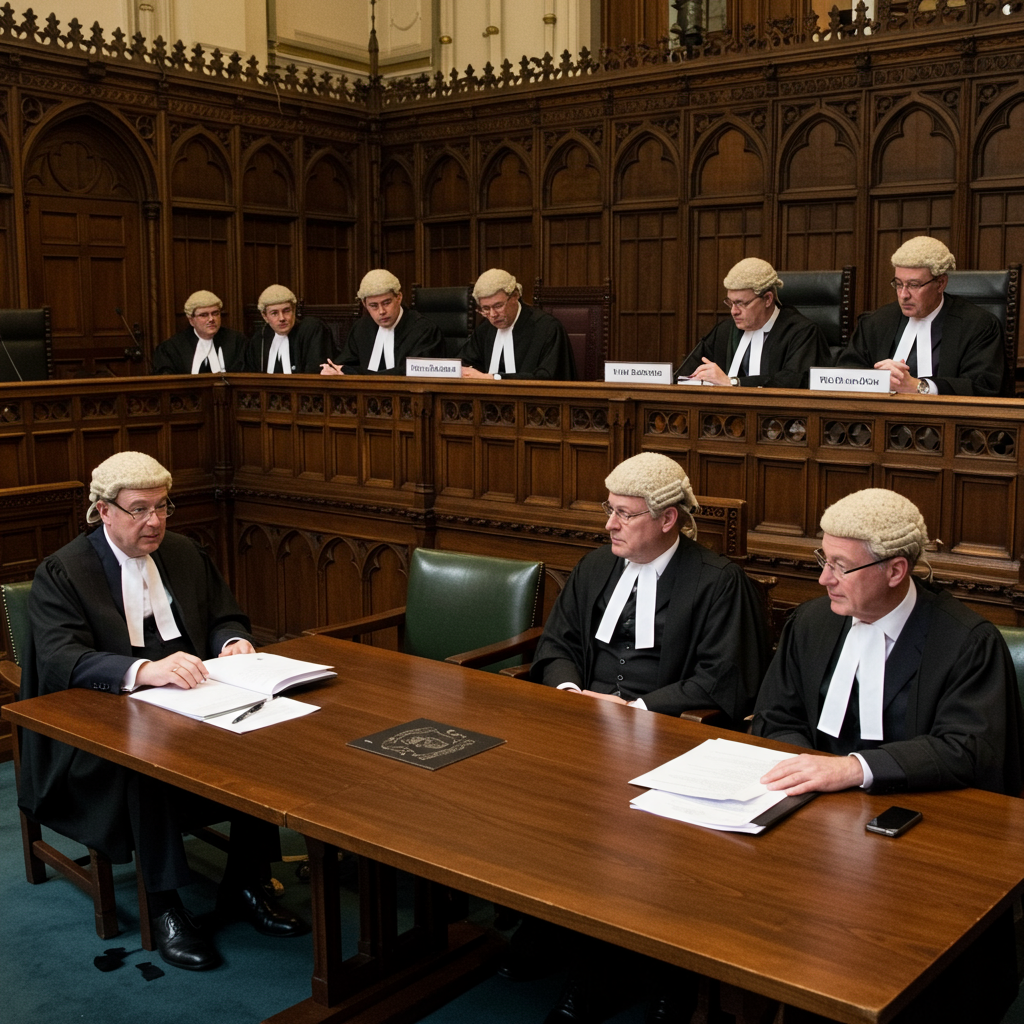In a landmark decision, senior judges in the UK High court have mandated a completely new, independent investigation into instances where the UK’s domestic intelligence agency, MI5, provided false evidence to multiple courts. This significant ruling follows the judges’ outright rejection of two earlier official inquiries into the matter, which they found to be fundamentally flawed and unreliable. The court’s order underscores the critical importance of transparency and candour from state agencies, especially in judicial proceedings.
The necessity for this robust new MI5 false evidence investigation arose directly from revelations brought to light by a comprehensive BBC inquiry. This original reporting centred on a controversial neo-Nazi figure, known pseudonymously as X, who was also operating as a state agent for MI5. The BBC investigation uncovered evidence challenging MI5’s official statements to three separate courts regarding their core “neither confirm nor deny” (NCND) secrecy policy concerning agent X’s status.
MI5 had asserted in court that it had strictly adhered to the NCND policy in this specific case. However, the BBC presented compelling counter-evidence, including detailed notes and recordings of phone calls with MI5 officers. This evidence clearly demonstrated that an MI5 officer had explicitly confirmed the agent’s status during attempts to dissuade the journalist from pursuing the investigation into X. This proved MI5’s court statements were false.
Why Previous Inquiries Were Rejected
The High Court judges panel, comprising three senior figures, delivered a damning assessment of the two preceding official investigations. One was an internal review conducted by MI5 itself, while the other was an “external” inquiry led by former chief lawyer Sir Jonathan Jones KC, commissioned jointly by the Home Secretary and MI5’s Director General. Both reviews had concluded that neither MI5 as an organisation nor its officers were guilty of deliberate wrongdoing in providing the false information.
However, the judges found these conclusions untenable. They identified what they termed “serious procedural deficiencies” within both investigations, stating plainly that they could not place any reliance on their findings. A significant point of criticism was a “fundamental incoherence” in the terms of reference set for the external review.
Serious Flaws Highlighted by Judges
The judges’ criticisms were specific and severe. They noted that the terms of reference for the external review paradoxically requested the establishment of facts but explicitly excluded any investigation into why individuals acted in the manner they did. Despite this limitation, the review inexplicably proceeded to make findings of no deliberate misleading.
Furthermore, the judges highlighted that a central MI5 officer directly involved was not interviewed as part of the external review. Crucially, key evidence gathered by the BBC, which fundamentally contradicted MI5’s narrative and formed the basis of the exposure, was reportedly not properly considered by the external review. These omissions severely undermined the credibility of its findings.
MI5’s Misleading Disclosures to the Courts
Beyond the failings of the official reviews, the High Court judges also scrutinised MI5’s conduct directly before the courts. The judgement noted that MI5’s director general of strategy had provided misleading assurances to the court in a witness statement. These assurances pertained to the accuracy of MI5’s initial explanations, which were given before the court compelled the disclosure of secret material relevant to the case.
Once the court mandated the release of this sensitive information, the judges found MI5’s subsequent explanations were far from candid or accurate. They omitted critical details, including the fact that the Investigatory Powers Commissioner’s office (IPCO) – a key oversight body – had itself been misled by MI5. The explanations also failed to adequately detail what various MI5 officers knew at different stages.
The judges described MI5’s manner of providing information to the court as having been done in a “piecemeal and unsatisfactory way.” They concluded that this approach created the distinct impression that the truth had to be “extracted from, not volunteered by, MI5.” This lack of voluntary candour is a serious concern for judicial oversight.
Entities Misled by MI5
In this single case alone, the court found that MI5 had provided misleading information to a concerning number of official bodies and legal representatives. This included:
Two separate branches of the High Court itself.
The Investigatory Powers Tribunal (IPT), which handles complaints about the intelligence services.
The Investigatory Powers Commissioner’s office (IPCO), the independent oversight body.
Security-cleared barristers, known as “special advocates,” who represent individuals in closed court proceedings where sensitive material is involved.
The judges also commented that MI5 continued to maintain the strict NCND policy stance in proceedings long after any genuine justification for applying it in this specific context had ceased to exist.
A particularly striking failure of the previous official reviews, according to the judges, was their failure to even contact the BBC journalist whose work was central to exposing the false evidence in the first place. Although the journalist subsequently submitted evidence, including records reportedly showing false statements within the reviews themselves, this crucial perspective painting a “significantly different picture” that fundamentally challenged the reviews’ basis was not adequately addressed initially.
The New Independent Investigation
Following their rejection of the previous inquiries, the High Court judges issued an order for a completely new investigation. This probe is mandated to be “robust and independent.” Crucially, it will be carried out under the direct auspices of the Investigatory Powers Commissioner, Sir Brian Leveson. The choice of Sir Brian Leveson’s office to lead this MI5 false evidence investigation is significant, given that IPCO itself was among the bodies misled by MI5.
Sir Brian Leveson has acknowledged the seriousness of the situation, stating publicly that MI5’s compliance with its statutory duties in this case “fell short.” Leading this new inquiry places the investigation under an independent body with statutory oversight powers over intelligence agency conduct, aiming to ensure a more thorough and unbiased examination of the facts.
The High Court panel took the unusual step of commending the BBC and its correspondent, Daniel De Simone, for their “central role” in bringing these grave matters to light. This judicial acknowledgement highlights the vital function investigative journalism serves in holding powerful state institutions accountable.
The judges stated that it would be “premature” to consider contempt of court proceedings against any individuals involved before this new, comprehensive investigation is completed. The findings of the IPCO-led probe will likely inform any potential future legal actions or sanctions.
Reactions and Implications
Responding to the High Court’s judgement, MI5 Director General Sir Ken McCallum issued a statement offering a “full and unreserved apology” for the errors that occurred. He committed to cooperating fully with the IPCO-led investigation, recognising that maintaining the trust and confidence of the courts is absolutely essential for MI5 to effectively carry out its crucial national security mission.
Beth, the lawyer representing the former girlfriend of agent X, welcomed the judgement. She stated that it represented a clear rejection of MI5’s previous explanations and served as a serious warning to the intelligence agency. Beth raised concerns that MI5 had sought to hide behind the necessary but sometimes overly restrictive NCND policy. She emphasised the absolute necessity of “high standards of candour” for accountability safeguards, designed to protect the public and the legal process, to function correctly.
This entire case is widely seen as a major test of the courts’ view of MI5’s credibility. The judiciary relies heavily on the honesty and complete disclosure of intelligence agencies in cases involving national security. This ruling sends a strong signal that courts will rigorously scrutinise the information provided and demand full candour, even when dealing with highly sensitive matters. The outcome of the new MI5 false evidence investigation will be critical in determining the path forward for judicial oversight of the intelligence services and rebuilding trust where it has been eroded.
Frequently Asked Questions
What was the core issue regarding MI5’s testimony in court?
The central problem involved MI5 providing false information to multiple courts regarding its “neither confirm nor deny” (NCND) secrecy policy concerning a specific state agent known as X. MI5 claimed it had never breached this policy regarding X’s status in court proceedings, but a BBC investigation presented evidence showing an MI5 officer had, in fact, confirmed the agent’s status to a journalist, contradicting the agency’s court statements.
Why did the High Court judges reject the previous investigations into MI5?
Senior judges rejected two prior inquiries (one internal MI5, one external) because they found them seriously “deficient” and unreliable. They cited “serious procedural deficiencies,” including a flawed scope that didn’t investigate why actions occurred, failure to interview key individuals, and insufficient consideration of crucial evidence provided by the BBC that contradicted MI5’s narrative.
Who is leading the new investigation into MI5, and what is its purpose?
The High Court has ordered a “robust and independent” new MI5 false evidence investigation to be carried out under the authority of the Investigatory Powers Commissioner (IPCO), Sir Brian Leveson. The purpose is to conduct a thorough re-examination of the instances of false testimony and disclosure failures by MI5, with the aim of establishing the full facts independently, particularly given that IPCO was among the bodies previously misled.
Conclusion
The High Court’s order for a new MI5 false evidence investigation marks a pivotal moment for accountability within the UK’s intelligence framework. By rejecting previous inquiries and mandating an independent probe under the Investigatory Powers Commissioner, the judges have sent an unmistakable message: intelligence agencies must uphold the highest standards of candour and transparency when engaging with the judicial system. This case highlights the essential tension between necessary state secrecy and the fundamental requirement for honesty in court, upon which trust in both the judiciary and the intelligence services ultimately depends. The findings of this new investigation will be keenly awaited and will likely have lasting implications for how MI5 interacts with the courts and its oversight bodies.


